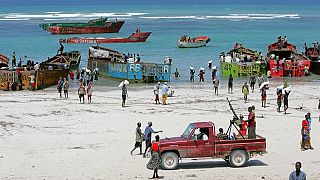Contamination of water
In blistering heat, several dozen volunteers are busy collecting plastic bottles, bags and polystyrene boxes as they launch a cleanup of the longest beach in Lagos.
Nigeria's megacity of 20 million people produces between 13,000 and 15,000 tonnes of waste per day, including 2,250 tonnes of plastic, according to a Lagos recycling startup, WeCyclers.
Despite recent cleanup efforts and an emerging recycling sector, Lagos has no rubbish sorting system, and lack of public awareness about pollution presents a huge environmental challenge.
Litter in Africa's most populous city gets whisked away by the rains and waterways and ends up in piles of trash on the sprawling beaches.
Lighthouse Beach stretches for about 100 kilometres (60 miles) along the Atlantic, all the way to neighbouring Benin. Lined with palm trees, the beach could be heavenly -- if it weren't for all the pollution.
"It's time we raise awareness about keeping the environment clean, especially with all the plastic," said Chioma Chukwura, a marketing consultant helping to pick up garbage on the beach.
At the end of a tiring day, 230 large bin bags are piled up on the hot sand, filled with dirty plastic.
"A recycling company will come and pick them up tomorrow," Owoade Yussuf, organiser of the cleanup, said. "All the plastic here will get recycled."
Sold for $500 (420 euros) a tonne, recycled plastic could bring $250 million to Lagos each year, he argued. And a cleaner environment could bolster other sectors.
Yussuf said Nigerians could be encouraged to adopt the beach lifestyle, something that would improve the livelihood of local communities.
"However, to attract people to the beach, you need a clean beach," he pointed out.
As the volunteers leave at the end of the day, just 100 metres (yards) is "clean." There is still a lot to do.
"Maybe two months, constantly, every day, to get this cleaned up," said another volunteer, Ebube Nwosu, who works in IT.
"And we have to find a way to prevent it (the plastic) from coming back. After we are done, I'm sure when we come back, we may still see litter here."
Experts with France's National Centre for Scientific Research (CNRS) reported in February that about 10 million tonnes of plastic end up in the world's oceans each year.
But at Lighthouse, the issue isn't just plastic. Rusting shipwrecks pollute the beaches, abandoned by their international owners to avoid paying for scrapping them as required by global environmental norms.
With that kind of giant pollution, even an army of volunteers may struggle. But they are hopeful that with more help they can make a difference.
Another collection is planned for June or earlier, Yussuf said.
"Hopefully we can get 100 volunteers for the next cleanup and also involve the local community there and finish it up."











Go to video
Nigeria opposition leader Atiku Abubakar quits former ruling PDP party
01:04
Nigeria: inflation falls slightly for third month straight, crisis not over
02:17
London Mayor Sadiq Khan visits Lagos to strengthen UK-Nigeria tech and creative ties
01:30
Nigerian singer Tems launches Leading Vibe Initiative to support women in music
Go to video
Nigeria completes $3.4 Billion IMF COVID-19 loan repayment, faces ongoing annual charges
02:02
New pipeline project transforms Kibera’s water access